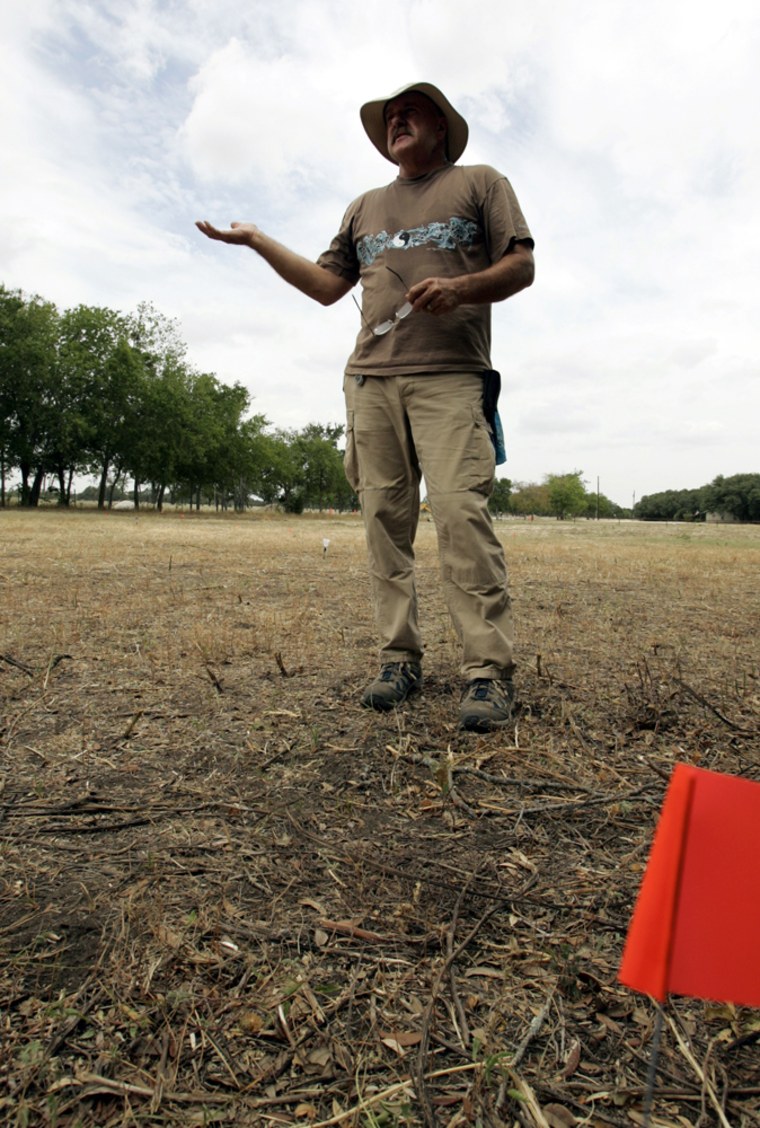Like many folks in President Bush’s adopted hometown, 83-year-old Robert Westerfield isn’t exactly rolling out the welcome mat for the town’s newest resident: War protester Cindy Sheehan.
“I wish she’d stay away. Crawford’s a Republican town, and she’s a dumb Democrat,” Westerfield, a lifelong Crawford resident, said Friday while sitting on a bench outside a gas station on Main Street.
Sheehan, whose monthlong war protest near Bush’s ranch last summer attracted more than 10,000 demonstrators, recently bankrolled the purchase of a 5-acre parcel near downtown to be used for future protests, including one next month.
The protesters group said it outgrew a 1-acre lot about a mile from Bush’s ranch that a sympathetic landowner provided. Several hundred demonstrators returned to the lot over Thanksgiving and Easter.
Now many of the town’s 700 residents fear the traffic congestion, noise from rallies and odor from portable toilets — complaints from residents near the other campsite — will affect those closer to town.
“When it’s here, it affects a different set of people,” Teresa Bowdoin said.
Gerry Fonseca, a Vietnam veteran who attended the protests in August and April, returned to Crawford in June to help the group look for property.
Land wasn't sold to Sheehan herself
Fonseca said he doubts that any Crawford landowner would have sold to Sheehan or other protesters, so he didn’t reveal his connection. Fonseca, who lost his Slidell, La., home in Hurricane Katrina, told sellers about that part of his life and that he wanted to build.
He bought the $52,500 lot in mid-July, using insurance money that Sheehan received after her oldest son Casey was killed in Iraq in 2004.
The lot is a tenth of a mile from a small “Welcome to Crawford” billboard featuring a picture of Bush, smiling with his hand in a thumbs-up sign, and his wife.
The land is comprised of pasture and tree groves. Trucks began dumping gravel for a driveway on Friday, and water lines will be installed next week. Fonseca said he is still trying to arrange for electricity to be hooked up.
Although the site is more than 7 miles from Bush’s ranch, it will have more space for the group’s large activities tent, camping area and parking.
“This is close enough. We’re still protesting in the community that he chose to live in,” Fonseca said.
Sheehan said when the camp is no longer needed, she plans to donate the land to the city for a park to be named Spc. Casey Sheehan Memorial Peace Park. Sheehan said it would have a playground, because “Casey loved children and peace.”
When Sheehan first arrived in Crawford last August, demanding to meet with the president during his monthlong working vacation, she and others set up tents in ditches off the winding, two-lane road leading to the ranch.
But the area became crowded as weekend protests swelled to several thousand people — and spurred counter protests with Bush supporters — so a sympathetic landowner let the group use his parcel that was even closer to the ranch.
Then last fall, county commissioners enacted roadside camping and parking bans to prevent similar protests. Some demonstrators returned to Sheehan’s original makeshift campsite during the November and April protests for a civil disobedience action and were arrested. Sheehan was not among them.
Symbolic space
In late June, Sheehan and four others sued the county over the ordinances, saying they want to return to what became an “international symbol of protest against the Iraq war.”
Tammara Rosenleaf, one of the lawsuit’s plaintiffs, said she is glad the group now owns a lot but that some protesters may return to Sheehan’s original site because it is considered “the soul of this movement.”
Bill Johnson, owner of the Yellow Rose of Texas gift shop, disagrees with Sheehan’s views of Bush and the war in Iraq and said he hopes protesters are considerate of their new neighbors. Last summer, the group disrupted the peaceful country life of some rural residents near Bush’s ranch, he said.
“I don’t want her rights taken away. Her son fought and died for this country,” Johnson said. “But on the other hand, she needs to be respectful for what our country stands for.”
